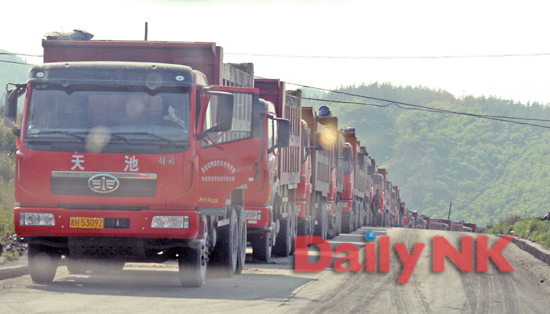 Chinese trucks wait to enter Musan Mine. |
Coal mining in North Korea is set to increase as the export
price for coal to China has risen by more than 20 USD per ton compared to
earlier this year. Experts have noted that the North Korean regime will benefit
significantly through the increased level of coal exports to China, which had
contracted due to sanctions.
A source in South Pyongan Province reported to Daily NK on
October 12 that domestic mines in North Korea have recently increased coal
production rates, which were previously reduced due to sanctions. DonjuLiterally "masters of money," donju refers to people who hav... More (newly
affluent middle class) are cashing in on the coal export business, as it is a
lucrative source of foreign currency.
“The price for North Korean coal exported to China
began to fall last year because the Chinese government established
environmental regulations and the sanctions on North Korea only worsened the
situation. So only small quantities were exported, as the price for North
Korean coal declined to 40 USD per ton, even for high quality material,” the source noted. “But the coal price began to rise a few months ago, and
now coal exported to China brings in 62 USD per ton.”
“There are rumors that the coal price will soar to 100 USD per ton,” she added, explaining this may occur if Chinese companies
increase their level of demand.
Coal was one of North Korea’s primary exports before falling
demand from China, international sanctions, and a general decline in the prices
of raw materials due to the global economic slowdown took effect.
North Korean trading companies continued to export coal
after initiating desulfurization techniques (as required by the Chinese
government), as well as through smuggling activities. However, the flow of
foreign currency had been in decline due to fundamental issues affecting
profitability.
Strict quality inspection procedures for imported coal by
the Chinese authorities have reportedly loosened since August as the domestic
demand for North Korean coal increases.
Coal prices in China skyrocketed as domestic coal production
slumped due to regulations imposed by the Chinese government to prevent air
pollution, as well as overproduction issues and flood damage affecting mines in
China’s northern regions. Therefore, the demand and price for North Korean coal
has subsequently increased as Chinese traders turn to relatively cheaper
sources of coal.
The Chinese government is seeking solutions to stabilize the
skyrocketing price of coal, although demand is expected to keep increasing with
the oncoming winter.
“Hundreds of 30-ton trucks loaded with coal can be seen every day on the
expressway heading to Port Nampo and Port Songrim, where exports are shipped to
China,” another source in South Pyongan Province told Daily NK.
“As coal exports are booming again, state coal mines
are actively producing coal by supplying domestically-produced wooden
beams. Prices in the service sector, including
restaurants around the coal mine area are also rising as donjuLiterally "masters of money," donju refers to people who hav... More from across the
country are capitalizing on the boom.”
She asserted that as the circulation of money has
been stimulated, the North Korean regime can afford to secure its “leadership
funds.”
But there are also concerns that ordinary residents will
have difficulty with heating as coal exports to China increase. This is because
when the regime places a priority on securing governing funds, it significantly
reduces the internal supply of coal in favor of exports.
“Many residents need to buy coal in preparation for
winter, but they can’t afford the current prices,” the source added.
“There are also rumors within the coal mines that there will be no extra
supplies left for residents as the companies must ensure they can meet the
quotas in their export contracts.”
However, it is unlikely that the surge in coal price will be
sustained for an extended period of time, as domestic production in China is
also set to increase with the support of the Chinese government.




















